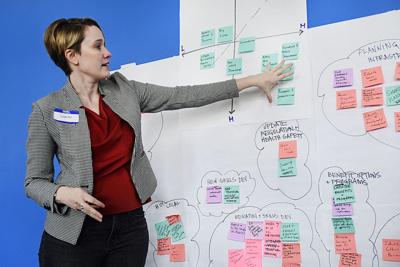By GREG JORDAN
Bluefield Daily Telegraph
BLUEFIELD — Creating more affordable housing and training a workforce ready to build it with new industrial techniques was the topic Thursday between economic developers and the area’s business community.
A seminar at the Bluefield Economic Development Authority’s offices in downtown Bluefield brought together businesses and Virginia Tech to explore how industrial offsite construction could create more affordable housing for West Virginia and the rest of the nation.
Industrial offsite construction, sometimes called IOC, is a construction system including industrial principles such as mechanization, standardization, robotics, optimization, digital technologies and transportation to connect onsite human-based processes with offsite manufacturing. This leads to better productivity, substitutes labor-repetitive or intensive processes, fast-tracks construction and commissioning while reducing costs and risks.
“Part of the goals of the grant that we’ve received is to try and bring better efficiencies into the construction industry to reduce waste, to increase quality but also to bring opportunity to parts of Appalachia that need different economic opportunities or housing opportunities, things like that,” said Andrew McCoy with Virginia Tech in Blacksburg, Va. “The goal here is to show that we can’t do any of that, we can’t bring industrial processes to the construction industry without a workforce that’s trained to do that.”
Coming together with people interested in the industrial process helps foster the move to IOC.
“We can go and read up on all the different ways we think and that the media or the scholarly literature thinks we need to be training people but we also want to have workshops regionally where people who are local thought leaders or in touch with what’s happening locally,” McCoy said. “They can tell us ‘this is what we really need.’ We try to cater this curriculum we’re developing to industrialize the construction industry to local regions and see where we have good capacity or we might need to build capacity and that could be through the workforce. It could be through other areas, so we’re asking a whole set of questions. Really what it comes down to is trying to take what we know we can do very efficiently in a manufacturing kind of automated setting in a factory and figure out how to get the industry to adopt some of those that will hopefully open up affordable options in the housing stock.”
Housing is a big part of offsite construction, McCoy said.
“Affordable housing is a big problem all around the country,” said Colby Swanson with ADL Ventures. “And West Virginia is no different, so traditional construction methods aren’t closing that gap; and so industrialized offsite construction is that pivot that will both lower the cost of housing, produce more housing and at better performance.”
Omnis Building Technologies near Bluefield is preparing to use such industrial technologies.
“Omnis is a great example,” Swanson said. “They’re a local company, started recently and they use industrialized methods. They’re prefabbing components to a house in their factory, they get sent to the job site and then assembled. We need more of those. We need more Omnis in West Virginia. We need more Omnis all throughout the country.”
Meeting local people allows Virginia Tech and interested businesses to learn more about local challenges and opportunities, McCoy said.
“Over time, we come to a consensus about the places we want to focus our efforts,” McCoy said. “And hopefully that will translate into curriculum to train the workforce to get us there.”
“To get more affordable housing, we need more workers in the construction space,” Swanson said. “And rather than have traditional, conventional construction work, we’re trying to train a new set of construction workers in industrialized construction methods like Omnis. And those are different skill sets.”
Workers trained in offsite construction are needed, but another goal is to work with the existing construction industry. It is not the goal of offsite construction to replace the existing construction industry, McCoy said.
“The goal is to create interest and excitement and a pathway broadly that can be very technical, but also we also realize there is a component that really has to interface with the existing construction site and the companies that are working in that space as well,” he said. “This is meant to identify broadly. Yes, it is moving towards how do we industrialize because we need to produce more housing and we need to have more options quickly.”
“And we don’t have a lot of labor,” McCoy said. “But in the process, we’re trying to be very careful to make sure that the existing construction industry knows this is also a way to attract more workers into what they’re doing and possibly have some of these technologies on the construction site as well, things like that.”
— Contact Greg Jordan at gjordan@bdtonline.com


















Commented
Sorry, there are no recent results for popular commented articles.